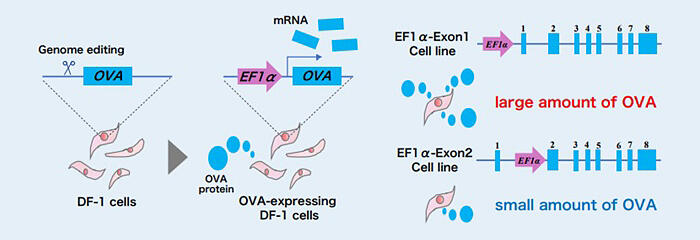A research group led by Professor Hiroyuki Horiuchi of the Graduate School of Integrated Sciences for Life at Hiroshima University announced that they successfully used genome editing technology to establish a cell line that constantly secretes ovalbumin (OVA), a major component of egg white. According to their announcement, they used the established cell line to construct a system for evaluating recombinant protein production. Using the cultured cell line, they confirmed that the evaluation of a system for producing useful substances with the chicken, which normally requires two to three years, can be carried out in vitro in a short period. The newly developed evaluation method will lead to the efficient production of useful substances such as pharmaceuticals. The results were published on October 19 in the international academic publication Biotechnology Journal.

Provided by Hiroshima University
Although the demand for biopharmaceuticals continues to grow, high production costs and associated increases in drug prices are critical issues to be resolved. Given that a hen lays approximately 300 eggs in a year, and chicken eggs are rich in protein, there are expectations for their use as biological factories to efficiently produce recombinant proteins such as antibodies and cytokines. However, it typically takes two to three years to produce recombinant protein using genome-edited chicken eggs. A cell line that secretes egg-white components had yet to be established, and in vitro evaluation of the products was impossible.
In the present study, the research group used genome editing technology to activate OVA expression, which is inactive in cultured chicken cells, and established a cell line that secretes OVA. Examination of the editing sites revealed that some untranslated regions of the OVA gene locus are shown to be important for secreting more OVA protein. Using the established OVA-secreting cell line, the researchers determined the position to introduce the gene coding for the recombinant protein and found that the upstream region of OVA was suitable as the introduction site.
By creating genome-edited chickens, the research group in the future will aim to establish a system that enables the production of a variety of useful substances at low cost. Horiuchi commented, "The production system with chicken eggs has the potential to reduce the costs of producing expensive protein-based drugs and the medical materials necessary for regenerative medicine. However, there is currently no pre-evaluation system. Companies have been reluctant to introduce the production system because they cannot evaluate the utility of the product unless several years are spent for its development. We believe that our technology can evaluate the utility within a few months and provides a production system based on chicken eggs that meets the needs of companies."
This article has been translated by JST with permission from The Science News Ltd. (https://sci-news.co.jp/). Unauthorized reproduction of the article and photographs is prohibited.




